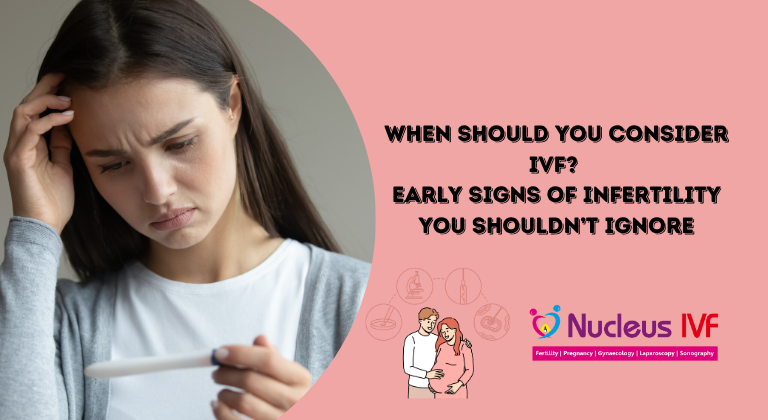By Dr. Pritam Sulakhe, Senior IVF & Fertility Specialist – Nucleus IVF, Wakad, Pune
Infertility is an emotional and physical challenge faced by many couples today. While some conceive naturally within a few months, others struggle for years, unsure of when to seek help. Understanding the early signs of infertility and knowing the right time to consider IVF (In Vitro Fertilization) can make a significant difference in your parenthood journey.

At Nucleus IVF, Wakad, Pune, Dr. Pritam Sulakhe, a highly experienced fertility specialist, helps couples identify these signs early and guides them with the right fertility treatment tailored to their unique condition. This blog explores when IVF becomes necessary, early infertility signs, and how timing can affect IVF success.
What is IVF and How Does it Work?
IVF, or In Vitro Fertilization, is one of the most effective and advanced treatments for couples who are unable to conceive naturally. It involves fertilizing an egg with sperm outside the body, in a laboratory, and then transferring the healthy embryo back into the uterus.
IVF Step-by-Step Process:
- Ovulation Stimulation – Fertility medications are given to stimulate multiple egg production.
- Egg Retrieval – Mature eggs are collected from the ovaries.
- Sperm Collection – A semen sample is collected and processed in the lab.
- Fertilization – Eggs and sperm are combined for fertilization.
- Embryo Culture – Fertilized eggs grow into embryos over a few days.
- Embryo Transfer – A healthy embryo is transferred into the uterus.
- Pregnancy Test – A blood test after 10–14 days confirms pregnancy.
Why Timing is Important in IVF
Timing is one of the most critical factors in IVF success. Both biological and clinical timing matter:
- Biologically, a woman’s fertility starts declining significantly after age 35.
- Clinically, the IVF cycle must be precisely timed – from medication to embryo transfer.
Starting IVF too early without exploring simpler treatments might not be necessary. On the other hand, delaying treatment—especially with increasing age—may reduce success chances. That’s why personalized consultation with a fertility specialist is vital.

When Should You Consider IVF?
Many couples wonder, “How do I know it’s time for IVF?” IVF is often recommended when:
- You’ve been trying to conceive for over 1 year naturally (or 6 months if over 35).
- Fertility issues are diagnosed in either partner.
- Previous fertility treatments like IUI or ovulation induction have failed.
Situations where IVF is Recommended:
- Blocked or damaged fallopian tubes
- Low sperm count or poor sperm motility
- Polycystic Ovary Syndrome (PCOS)
- Endometriosis
- Unexplained infertility
- Multiple failed IUI cycles
- Older women wishing to preserve fertility or use donor eggs
Early Signs of Infertility You Shouldn’t Ignore
Infertility is not always obvious. But there are early red flags you should be aware of:
For Women:
- Irregular, very heavy, or no periods at all
- Painful menstruation or pelvic pain (could signal endometriosis)
- Hormonal imbalance signs (excess facial hair, acne, weight gain)
- History of miscarriages
- Difficulty tracking ovulation
For Men:
- Low sex drive
- Erectile dysfunction
- Pain or swelling in testicles
- Abnormal semen analysis (low count, poor motility)
If you or your partner experience any of these symptoms, it’s advisable to consult a fertility specialist early.
How Age Affects IVF Success
Age plays a major role in fertility and IVF outcomes. Female fertility begins to decline rapidly after 35, and egg quality decreases significantly after 40. While IVF can still be successful after 40, the chances are lower, and donor eggs may be recommended.
IVF Success by Age Group:
- Under 35: Higher success rate (40-50%)
- 35–39: Moderate success rate (30-40%)
- 40+: Lower success rate (10-20%)
Men are also affected by age, though less significantly. Sperm quality can decline after 40, affecting fertilization and embryo health.
Trying Naturally vs. IVF: How Long Should You Wait?
It’s natural to hope for a spontaneous pregnancy, but waiting too long may lead to lost time—especially for women above 35. Here’s a general guide:
- Under 35: Try naturally for up to 12 months.
- Above 35: Seek medical advice after 6 months of trying.
- Above 40 or known fertility issues: Seek immediate consultation.
Signs That It Might Be the Right Time to Begin IVF
- No pregnancy after 6–12 months of regular unprotected intercourse
- Diagnosed conditions like PCOS, endometriosis, or male infertility
- Multiple failed attempts with IUI or fertility medications
- Frequent miscarriages
- Desire to preserve fertility (social or medical egg/sperm freezing)
- Using donor sperm/eggs or surrogacy options
When IVF May Not Be Needed Immediately
Not every couple needs IVF right away. In some cases, simpler treatments or lifestyle adjustments may work:
- Mild male factor infertility
- Irregular ovulation due to stress or hormonal imbalance
- Less than a year of trying naturally
- Blocked tube on only one side
- Younger women with no other health complications
A fertility expert will recommend IVF only when necessary and guide you through all available options.
Final Words: Making the Right Decision at the Right Time
The decision to start IVF is deeply personal, and the right timing depends on age, fertility status, and emotional readiness. If you’re unsure whether IVF is the next step, don’t delay professional advice.
At Nucleus IVF, Wakad, Pune, Dr. Pritam Prakash Sulakhe has helped thousands of couples make informed decisions and begin their journey to parenthood with clarity and confidence.
Need Expert Fertility Guidance?
Contact Nucleus IVF today and schedule a consultation with Dr. Pritam Sulakhe to understand your options.
📞 Call: +91-9175101351
📍 Visit: Nucleus IVF, Wakad, Pune
🌐 Website: www.nucleusivf.com
Frequently Asked Questions (FAQs)
- How do I know if I need IVF?
If you have tried to conceive for over a year (or 6 months if over 35) without success or have diagnosed fertility issues, you should consult a fertility expert to evaluate if IVF is right for you.
- What is the best age to go for IVF?
The best IVF success rates are seen in women under 35. However, IVF can still be effective up to age 40 and beyond with proper medical support.
- Can IVF work if I have PCOS?
Yes, IVF is a successful treatment option for women with PCOS who do not respond to medications or IUI.
- Is IVF the only option for infertility?
No, many cases are treatable with medications, IUI, or lifestyle changes. IVF is suggested when other treatments fail or in complex cases.
Dr. Pritam Prakash Sulakhe
Dr. Pritam Prakash Sulakhe
author
Dr. Pritam Prakash Sulakhe has completed his MBBS from B J Government Medical College , Pune which is one of the top medical College in India. He continued his post-graduation as DGO at same institute. After that he opted for Diplomat Of national Board In Obstetrics and Gynecology from Kerala Institute Of Medical Sciences Trivandrum, which is one of the most prestigious institute from South India.


